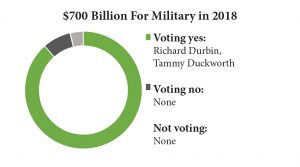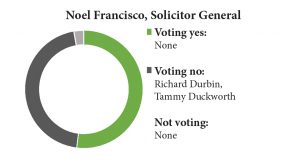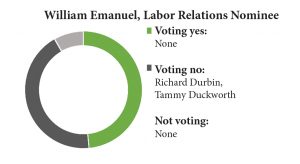How They Voted. Illinois Representatives’ Votes in Congress
Chronicle Media — September 23, 2017 $700 Billion For Military in 2018: Voting 89 for and eight against, the Senate on Sept. 18 authorized a $700 billion military budget (HR 2810) for fiscal 2018, including $60 billion in emergency spending for war-fighting in countries such as Afghanistan, Iraq and Syria; $50 billion-plus for active-duty and retiree health care; $8.5 billion for missile defenses; funding of a 2.1 percent pay raise for uniformed personnel; $500 million in military aid including weapons for Ukraine and $100 million to bolster Baltic defenses against any Russian aggression. The bill requires the administration to develop what apparently would be its first comprehensive strategy to counter Russia’s undermining of Western democracies and institutions. In addition, the bill would bar the transfer of detainees from the Guantanamo Bay, Cuba, military prison; fund programs for military victims of sexual assault; prohibit base closures and authorize tens of billions of dollars to fund conventional and nuclear weapons programs.
$700 Billion For Military in 2018: Voting 89 for and eight against, the Senate on Sept. 18 authorized a $700 billion military budget (HR 2810) for fiscal 2018, including $60 billion in emergency spending for war-fighting in countries such as Afghanistan, Iraq and Syria; $50 billion-plus for active-duty and retiree health care; $8.5 billion for missile defenses; funding of a 2.1 percent pay raise for uniformed personnel; $500 million in military aid including weapons for Ukraine and $100 million to bolster Baltic defenses against any Russian aggression. The bill requires the administration to develop what apparently would be its first comprehensive strategy to counter Russia’s undermining of Western democracies and institutions. In addition, the bill would bar the transfer of detainees from the Guantanamo Bay, Cuba, military prison; fund programs for military victims of sexual assault; prohibit base closures and authorize tens of billions of dollars to fund conventional and nuclear weapons programs.
Jack Reed, D-R.I., called it “disturbing…that the White House has failed to direct that a plan be developed to counter this Russian malign threat (and) prepare our country for renewed Russian interference in the upcoming 2018 and 2020 elections. Time is running out.”
Patrick Leahy, D-Vt., said the bill “continues to include the shameful and counterproductive measures that block us from ending the terrorist recruitment tool that is the Guantanamo Bay detention mission, but the core reason for my opposition to this bill is the reckless price tag….”
A yes vote was to pass the bill.
 Noel Francisco, Solicitor General: Voting 50 for and 47 against, the Senate on Sept. 19 confirmed Noel J. Francisco, 48, as the 48th solicitor general of the United States, a post that involves representing the U.S. government in litigation before the Supreme Court. A former law clerk to Supreme Court Justice Antonin Scalia, Francisco previously worked in private practice in Washington and in the White House under President George W. Bush.
Noel Francisco, Solicitor General: Voting 50 for and 47 against, the Senate on Sept. 19 confirmed Noel J. Francisco, 48, as the 48th solicitor general of the United States, a post that involves representing the U.S. government in litigation before the Supreme Court. A former law clerk to Supreme Court Justice Antonin Scalia, Francisco previously worked in private practice in Washington and in the White House under President George W. Bush.
Charles Grassley, R-Iowa, said Francisco “comes to us with impressive credentials….He has spent time in both the private sector at prestigious law firms and in the public sector as counsel to (President George W. Bush) and in leadership roles at the Department of Justice.”
Richard Durbin, D-Ill., said that in Francisco’s confirmation hearing, “I asked him if he agreed with President Trump’s absurd claim that three to five million people voted illegally in the 2016 election. He refused to answer the question. I asked him if he believed it was appropriate for a president to ask an FBI director to pledge loyalty to him. He declined to comment.”
A yes vote was to confirm Francisco.
 William Emanuel, Labor Relations Nominee: The Senate on Sept.19 voted, 49 for and 44 against, to advance the nomination of William J. Emanuel to serve a five-year term on the National Labor Relations Board, which is charged with overseeing collective bargaining and protecting workplace rights of both labor and management. The Senate is expected to vote soon to confirm the nominee, giving Republicans control of the five-member NLRB for the first time since 2008. It is customary for the party occupying the White House to hold a majority on the board. Emanuel had been an attorney in private practice in Los Angeles, specializing in labor-management litigation.
William Emanuel, Labor Relations Nominee: The Senate on Sept.19 voted, 49 for and 44 against, to advance the nomination of William J. Emanuel to serve a five-year term on the National Labor Relations Board, which is charged with overseeing collective bargaining and protecting workplace rights of both labor and management. The Senate is expected to vote soon to confirm the nominee, giving Republicans control of the five-member NLRB for the first time since 2008. It is customary for the party occupying the White House to hold a majority on the board. Emanuel had been an attorney in private practice in Los Angeles, specializing in labor-management litigation.
A yes vote was to move toward a final vote on the nomination.



